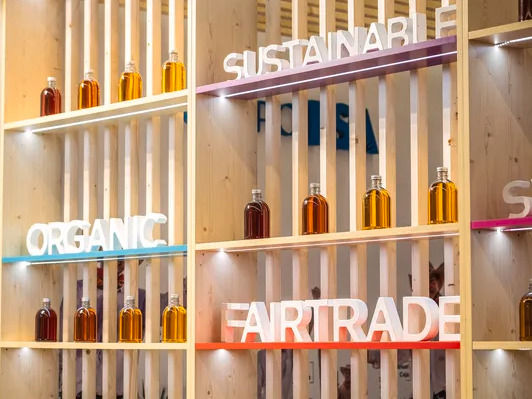The organic sector in the pandemic
BIOFACH eSPECIAL
BIOFACH, the World’s Leading Trade Fair for organic food, and VIVANESS, the International Trade Fair for Natural and Organic Personal Care, will be held purely digitally in 2021, from 17–19 February, as BIOFACH / VIVANESS 2021 eSPECIAL. In response to the current rapid spread of the coronavirus pandemic, the global organic sector will hold its annual “class reunion” in a virtual “classroom.” The eSPECIAL has three main focuses: exhibitor presentations, networking, and the conference. But the pandemic is causing changes and expanding digitalisation in more than just event formats. Apart from its impact on health, the economy, and society, it has also turned a spotlight on the need for a change in ecological practices and eating habits as well as movements for transformation. So the conference at BIOFACH 2021 eSPECIAL will be focusing on a highly topical subject – transformation, and how various social movements can advance it even better together: Shaping Transformation. Stronger. Together.

NürnbergMesse
Our planet’s equilibrium has been seriously disrupted – as is evident in our climate, the soil, water, other natural resources and species diversity, just to name a few aspects. But we’re currently also seeing something else: solidarity and values are becoming workable; established relationships and sustainable systems are proving their worth and are resilient. Yet the experts agree – the global organic movement that has grown up on the basis of these values also needs a transformation that looks to the future at every stage of the value chain. The organic transformation has to take place not just out in the fields – it also needs a new way of thinking about eating habits and consumer behaviour. Last but not least, a constructive, communal structuring of change with the participation of a wide range of allies, a transformation at every level: for the climate, for greater biodiversity, for greater fairness in the supply chain, and for food justice. In 2021, the international organic movement will be discussing exactly these issues at BIOFACH eSPECIAL.
Consumers more aware about food and health
Ever since the coronavirus crisis began, familiar practices and daily routines have come into question in every aspect of our lives. Things that were often under-appreciated parts of our pre-Covid normality – reliably full shelves in shops, specialties from far-off lands, global freedom of movement and much more – now prove to be restricted. And that has lent new importance to other things: healthy eating, organic products, products’ origins and how they’re processed, regional goods. Georg Kaiser, Managing Director of the Bio Company chain in Berlin, says, “At Bio Company we’re experiencing even more demand for regional foods than we already had before. Thanks to sound intuition and predictive management, our supply chains are quite secure.” German transformation researcher and social psychologist Harald Welzer says the pandemic has opened many consumers’ eyes. As though in a magnifying glass, many are suddenly seeing the connections between the pandemic and the exploitation of the planet – the whole system, he says, is disturbed. That has made consumers more aware of the relationship between food and health. Some are even focusing on strengthening their immune systems to protect against the virus – many are turning more to organic foods. “We’re sensing that clients are being more and more aware in their food shopping, and appreciate the qualities of organic products”, explains Lukas Nossol, Head of Marketing / Corporate Communications at Dennree.
Retail counts for the system
The pandemic is also bringing the services of everyone involved in retail into the limelight they’re relevant to the system . Nossol describes the situation in the market: 2020 posed major challenges for food retail. The biggest one was the temporary peak loads on intralogistics as a result of heavy nationwide demand for products to meet daily needs . Of course all the rules to reduce the risk of infection at our natural foo ds markets were also unfamiliar . Yet we overcame both challenges quickly and effectively thanks to close collaboration with our long standing partners and suppliers, and at the shops, and thanks to our employees’ dedication.” Kaiser at Bio Company had a s imilar experience : “With commitment and team spirit, we overcame the challenges quite well. By now we’ve made it all routine . It’s true that we’ve seen higher revenues during the waves. But on the other hand we’ve also had higher costs for things like pers onnel, installing Plexiglas barriers, setting up disinfectant dispensers, providing nose and mouth masks for our employees , and a lot more.”
Pandemic gives a lift to demand for organics worldwide
Amarjit Sahota, an international expert on the organic pr oducts market and the founder of Organic Monitor market researchers, now Ecovia Intelligence, of London, speaks of a “coronavirus b oost for the global organic industry”. From India to Europe to the USA, the pandemic has brought wholesalers and retailers a surge of up to 40% in demand from last year . Most of all, online business is booming so vigorous ly that Amazon, owner of organic foods giant Whole F oods , has now had to limit online organic food sales in the USA so it can meet the enormous demand , Sahota reports . The new health awareness has had two major effects . Consumers around the world are turning more and more to organic products. H oarding during the uncertain time of the first lockdown led to empty shelves and restocking problems for some groups of goods, including in German natural foods retailing . The situation has now calmed, and logistics is working properly again even for goods from other European countries and overseas.
Outlook : The international organics industry will continue to profit
Sahota takes a look back on the evolution of the organic market : organic foods were first introduced on a large scale in the early 1990s . It took more than 15 years until worldwide reve nues from organic products reached about 50 billion US dollars in 2008 . Within another ten years ( 2018), revenues passed 100 billion dollars . S ince Covid 19 is changing the way we shop and eat, the next leap to 150 billion dollars might arrive within the next 5 years, Sahota predicts . But certain condition s will be important to ensure that the organic sector’s growth is fair for everyone . The groundwork has be en laid, as Lukas Nossol also emphasises “While globalised commodity channels are hard to manage , partly because one doesn’t know some of the suppliers any more, the organic sector is well networked . Specialty retailers know who they’re working with, they’ re people they can talk to and work out solutions with . So we’re looking with confidence toward the upcoming year 2021.
Balance disrupted between supplier countries and selling markets
Yet it’s also true that the “international supplier network is under pressure”, Sahota admits . He explains the connection: many of the raw ingredients that are used by European and North American organic food companies come from Asia, Africa and Latin America . National lockdowns and uncertainties in managing the pandemic f irst interrupted many supply chains . Because of the pandemic, small organic farmers could no longer bring in some or all of their harvests, or could not export them . They are once again the people to suffer from a crisis . Take India as an example: the country is the source of organic tea, herbs, spices and other important organic ingredients . At the same time, the subcontinent is among the world’s regions most severely affected by Covid 19 .
Transformation: Changing our lifestyle
Prince Felix of Löwenstein, an organic farmer and long-standing Chairman of the BÖLW, the German Federation of Organic Food Producers – which is also a national supporting organization of BIOFACH – explains that one crucial factor for bringing about the ecological transformation will be to link the various transformation movements together in such a way that they can work creatively and reinforce one another in the same direction. In that regard, climate protection is one of the top priorities: “Land use has a considerable influence on our economy’s impact on the climate. Which all the more goes to show how important it is to lend active support to the climate protection movement, and to take every possible step to reduce CO2 emissions”, he says.































































